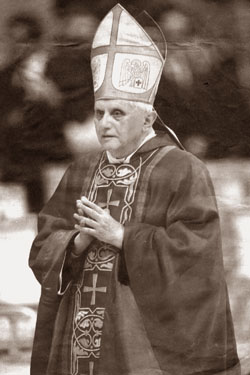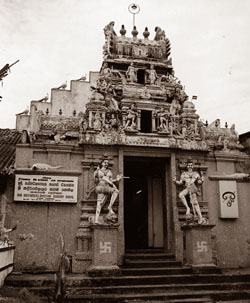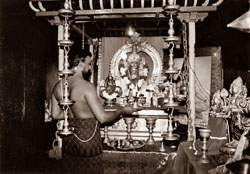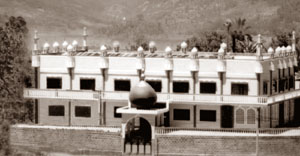
Pope Benedict XVI turns 80
Commodore Shemal Fernando RSP,USP,MSc
SECOND YEAR OF PAPACY: His Holiness Pope Benedict XVI
celebrated his 80th birthday on Monday April 16. His Holiness will mark
the 2nd year of His Papacy tomorrow April 19. He succeeded late Pope
John Paul II in 2004.
|

Pope Benedict XVI
|
Assuming office as the Head of the Catholics of World, the Pope said:
"After the great Pope John Paul II, the Cardinals have elected me, a
simple and humble worker in the vineyard of the Lord.
I am comforted by the fact that the Lord knows how to work and act
even with insufficient instruments...", with those first words from the
balcony of Saint Peter's Basilica in Rome. Cardinal Joseph Alois
Ratzinger took over the flock, as the chief shepherd of the Roman
Catholic Church.
Choosing the name Pope Benedict XVI, the new Pope elect said that the
last Pope Benedict, the Benedict XV who reigned from 1914 to 1922 had
been "a man of peace who served only briefly." On deeper reflection,
however, it became more apparent that the choice also had much, or even
more, to do with the fifth-century Saint Benedict and the fundamental
role his monastic movement played in rebuilding Europe after the Roman
Empire had collapsed.
At the Mass of Papal Installation on April 24, 2005, he asked, "Now,
at this moment, weak servant of God that I am, I must assume this
enormous task, which truly exceeds all human capacity. How will I be
able to do it?" Pope Benedict became the first Pope known to be of
direct Jewish descent since Saint Peter, the founder of the Church.
The 265th Shepherd of the Roman Catholic Church, went to the Conclave
to elect a candidate to succeed Pope John Paul II over whose funeral
service he presided. At 78, he was the oldest pope elected in 275 years,
since Pope Clement XII in 1730.
He is the 8th German Pope in history, but only the third from the
territory of modern-day Germany. The last German Pope, Adrian VI, was
elected in 1522 and died in 1523.
Before election Cardinal Ratzinger was identified as one of the 100
most influential people in the world by Time magazine. But once elected
he said: "The Pope is not an absolute monarch whose thoughts and desires
are law. He must not proclaim his own ideas, but rather constantly bind
himself and the Church to obedience to God's World."
Pope Benedict XVI smiles broadly and speaks often of the 'joy of
being a believer in Christ'. From the very start, he demonstrated a sort
of shy confidence and serene joy. His style and manner have been
strikingly similar to that of the delicate and erudite Paul VI, a lover
of the fine arts and classical music, than to the style of the robust
and charismatic John Paul II, who was sometimes called , 'God's
Athlete'.
Birth and priesthood
Pope Benedict was born to parents named Joseph and Maria on Holy
Saturday, April 16, 1927 in the town of Marktl am Inn, in the Diocese of
Passau in Germany. His father was a policeman and his mother a
housewife. The family was profoundly Catholic and his father attended
three masses every Sunday. His sister Maria was his long time secretary
and some believe, his model for the 'simple faithful'.
In the conservative Alpine foothills of Bavaria where he grew up,
Joseph Ratzinger remains a favourite son.
He left Tuebingen during student protests in the late 1960s and moved
to the more conservative University of Regensburg in his home state of
Bavaria which is a Catholic dominated area. He and his elder brother,
Georg used to visit the peaceful halls of St. Michael's Seminary
annually to stay in the elegant, but sparsely furnished bishop's
apartment.
An accomplished pianist who loves Mozart and Beethoven, Ratzinger
enjoys playing the grand piano in the seminary's main hall, and walking
through downtown Traunstein, meeting and greeting people.
Traunstein was also where Ratzinger went through the harrowing years
of Nazi rule and World War II. In his memoirs, Ratzinger wrote that he
was enrolled in the Nazi youth movement against his will when he was 14
in 1941, when membership was compulsory.
Two years later he was drafted into a Nazi anti-aircraft unit as a
helper, a common task for teenage boys too young to be soldiers. A year
later he was released, only to be sent to the Austrian-Hungarian border
to construct tank barriers.
He deserted the German Army in May 1945 and returned to Traunstein -
a risky move, since deserters were shot on the spot if caught, or
publicly hanged as examples to others. When he arrived home, US soldiers
took him prisoner and held him in a 'Prisoner of War' camp for several
weeks.
Ratzinger was ordained, along with his brother on June 29, 1951. He
quickly displayed extraordinary theological gifts and two years later
received a doctorate from the University of Munich.
As a young priest, he was an enthusiastic participant in the reforms
of the extraordinary Second Vatican Council from 1962 to 1965. He had a
distinguished 25-year teaching career as well at the universities in
Freising, Bonn, Munster, Tubingen and Regensburg.
In 1972, he founded the theological journal Communio which is now
published in seventeen languages (German, English, Spanish and many
others) apart from becoming one of the most important journals of
Catholic thought.
Archbishop and Cardinal
In March 1977, Ratzinger was named Archbishop of Munich and Freising.
In June same year, he was named a Cardinal by late Pope Paul VI. At the
time of the 2005 Conclave, he was one of only 14 remaining Cardinals
appointed by Pope Paul VI, and one of only 3 of those under the age of
80 and thus eligible to participate in that Conclave.
On November 25, 1981 the late Pope John Paul II named Cardinal
Ratzinger as the Prefect of the Congregation for the Doctrine of the
Faith, which was formerly known as the Holy Office of the Inquisition.
Cardinal Ratzinger was responsible for enforcing Catholic orthodoxy and
was one of the key men in the drive to shore up the faith of the world's
Roman Catholics.
He became Cardinal Bishop of the Episcopal See of Velletri-Segni in
1993, Vice-Dean of the College of Cardinals in 1998, and the Dean of the
College of Cardinals in 2002, becoming titular Bishop of Ostia.
As a Cardinal, he wrote 'Truth and Tolerance', a book in which he
denounces the use of tolerance as an excuse to distort the truth. He
also continued to defend the Second Vatican Council and the document
'Nostra Aetate' on respect of other religions and the declaration of the
right to religious freedom.
As the Prefect for the Congregation for the Doctrine of the Faith, he
clearly spelled out the Catholic Church's position on other religions in
'Dominus Iesus'.
Election as the Pontiff
It is important to note that Ratzinger's election to the papal office
was by no means certain. In conclaves men who are considered papabile
often are not elected to office. At times men considered certain to win
the election did not win. This is expressed in the saying, "He who
enters the conclave as Pope leaves as a Cardinal."
Ratzinger has repeatedly stated he would like to retire to a Bavarian
village and dedicate himself to writing books, but more recently, he
told friends he was ready to 'accept any charge God placed on him'. Pope
Benedict XVI speaks ten languages, such as German, Italian, English and
ecclesiastical Latin and also fluent in French.
Pope Benedict has inherited a Church that strives to remain faithful
to the Good News of Jesus in a changing world that often ridicules its
core beliefs in transcendence, objective truth and the dignity of human
person made in the image of the God.
Long live the Pope!
##################
Ancient historical account of Hinduism
"The Epic Age 200 B.C.-300 A.D."
Prof. Pon. Sakthivel
continued from last week
|

KOVIL:The Sri Kathirvelayuthan Swami Kovil alias Kataragama Kovil at
Kaluwella, Galle. It is one of the famous Kovils where people of all
ethnic groups throng to pay homage.
|
HISTORY: Buddhism is now gradually Hinduised and is later known as
Mahayana Buddhism. Indians begin to go abroad to start Hindu Kingdoms.
The fall of the Mauryan empire, together with the Ramayana and
Mahabharatha become instruments of a great Hindu revival and
renaissance.
As the upanishadic teaching are now brought home to the masses in a
very simplified form through these twin epics: which beyond doubt, has
been the greatest single factor in sustaining and rejunevating Hinduism.
There is now seen a fusion of Aryan and Dravidian culture. Shiva and
Durga attain the same status as Vishnu. The bormula of
Vama-Ashrama-Dhamma as well as Dharma-Artha-Kama-Moksha are now
popularly accepted.
Pravrthi (active life consisting of Dharma, Artha and Kama)- Nevruthi
(renunciating) become correctives to Buddhism's negation of life.
|

RITUALS: Rituals performed in the Kovil.
Picture by Mahinda Vithanachchi
|
Domestic virtues and active life are glorified. The heroes of the
Ramayana and Mahabharatha are idolised and idealised. The warm theistic
elements of the somewhat abstract Upanishads are now elaborated laying
more emphasis on a personal God (Iswara) who responds to Bhakthi.
The concept of Trimurti (Divine Trinity of Brahma Vishnu, Shiva)
leads to the concept of Avatara (Dwine Incarnation, which is a special
manifestation of the impersonal God) to Ishta Deiva (Chosen Deity) and
to the other paraphernalia-images, temples, processions, pilgrimages
etc, Dravidian and Aryan deities enjoy equal status, Manis laws guide
the life of the masses.
Brahminism now becomes Hindusim (or Sanathana Dharma) whose finest
product is the Bhagavad Gila, which, faithful to the earlier upanishads,
now applies it to practical life. Yoga, Karma, Yajna, Varna and Dharma
are correctly interpreted. Gnana is now correctly balanced with Karma
and Bhakthi, Hinduism tenets are now clear.
The Kural, Manimekhalai, Silappalhekerel and Samgam books are
products of the age in the South Thiravalliwar (composer of the Kural)
belongs to this age.
####################
Prophet Muhammad the exemplar to mankind
M.Y.M. Meeadh
|

MOSQUE: A new mosque has been constructed in Maskeliya and named in
remembrance of the Indonesian Memorial Mosque to commemorate the Haj
Pilgrims who died in an aircrash on December 04, 1974 at Virgin
Hills, Thebetrton Estate, Norton Bridge.
S. Duraisamy, Maskeliya group correspondent.
|
REVELATION: The Holy Quran is the Divine revelation from Allah
to His Last messenger - Prophet Muhammad (sal). It is the text of speech
revealed by Allah - not the text of talk by Prophet Muhammad (sal). On
this basic principle of Islam, let us find the Quranic perspective of
the Prophet Muhammad (sal) as the best exemplar to Mankind.
The Quran says as follows in the chapter 2 verse 147 about the role
played by Prophet Muhammad as enviaged by Almighty Allah.
"Thus we have made you (true Muslims - real believes of Islamic
Monotheism, true followers of Prophet Muhammad (sal) and his Sunnah
(Legal ways), a just (and the best) nation, that you be witnesses over
mankind and the messenger (Muhammad (sal) be a witness over you.
From the above Quranic verse, we can find that Allah's messenger has
been appointed as a witness (best exemplar) to Muslims in particular.
That means, it is through Muslim nation that Prophetic example is
demonstrated to entire mankind. However, it is quite obvious from this
Quarnic verse that Prophet Muhammad (sal) is a Universal messenger - to
the entire human race.
Further, The Quran describes the Prophet (sal) as a messenger with
truth - in the following Quranic verse.
"O Mankind, verily, there has come to you the messenger (Muhammad (sal))
with the truth from our Lord, so believe in him, it is better for you"
(4:170). From the above Quranic verse, it is quite clear that Prophet
Muhammad (sal)) had been truthful since his boyhood.
Before he started preaching Islam, he had commanded the respect of
the people in Mecca for his truthfulness He was popularly known as Al-Ameen
'the trustworthy' and honest. Even his enemies trusted him for his
honesty in all dealings.
Moreover, Allah has chosen Prophet Muhammad (sal) as the perfect Man
among the men of the world. Allah has recognised Prophet (sal) as an
exemplary man in the following Quranic verse; "Indeed, Allah, conferred
a great favour on the believers when He sent among them a messenger (Muhammed
sal), from among themselves, reciting unto them His verses (The Quran)
and purifying them (from sins by their following him) and instructing
them in the Book (the Quran) and Al-Hikmah (the Wisdom and Sunnah of the
Prophet) (i.e. his legal ways, statements, acts of worship) while before
that had been in manifest error." (3:164)
The above Quranic verse introduces Prophet Muhammad (sal) as an
exemplar to the entire human race.
Further, Allah, in His Quran, demonstrates to Mankind how he has
entrusted Prophet Muhammed (sal) with the sacred task of inviting all
humans to the right. straight Path. In this regard, the following
Quranic verse is relevant.
"Invite Mankind, O Muhammad to the way of your Lord (Islam) with
wisdom (i.e. with the divine revelation and the Quran) and fair
preaching and argue with them in a way that is better: (16:125) In
conclusion, we can say that Allah has sent his universal messenger with
the message of true guidance to entire mankind irrespective of ethnic
differences- Therefore, let all humans read The Quran and learn
something for his guidance from the practical example of Prophet
Muhammad (sal).
#######################
Christianity the emergence of Church
Miran Perera
continued from last week
ACKGROUND: The first Christian Church was organised at
Jerusalem, immediately after the resurrection and ascension of Jesus.
Subsequent to the preaching of the new faith outside Judea churches were
established at Antioch, Alexandria Ephesics, Corinth and other cities in
Rome and elsewhere.
It appears that a Christian church was founded at Rome during the
reign of the Roman Emperor Claudius (BC 10 - 54 AD). In every place it
is believed where a number of Christians habitually met together for
worship they formed a united body known as 'ecclesia' or congregation.
Each Ecclesia or united group of Christians was a church.
Among the local churches the one at Rome played a prominent role. It
was due to Paul probably more than to any other person that Christianity
assumed the form in which we now know it and which ultimately swept the
world.
Paul undertook a succession of missionary journeys to win disciples
for the new cause. In every place in which he arrived he founded a
synagogue which served as the scene and subsequently as the centre of
his activities. But he gradually became convinced that it was impossible
for Christianity to make headway while it was weighed down with the yoke
of the Jewish law its adherents having to submit to circumstances.
Soon the great Hellenistic city of Antioch in Syria became a centre
of Christian activity and influence. It was from Antioch that Paul and
others first set out on long mission fours for the definite purpose of
preaching the Gospel. For about 20 years he and his associates kept up
this work.
They endured hardships, they faced opposition, they were beaten and
flogged, shipwrecked and imprisoned but they were able to carry on their
proselytising campaign with success.
To be continued next week
We invite our readers to send their articles-news
events to our Religion Page. Limit your articles to 1,000 words. Your
contributions can be sent to, Daily News, No 35, D.R. Wijewardene
Mawatha, Colombo 10. E-mail:- editor@ dailynews.lk. |

